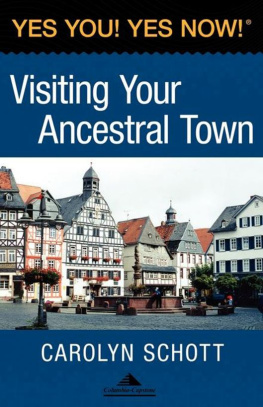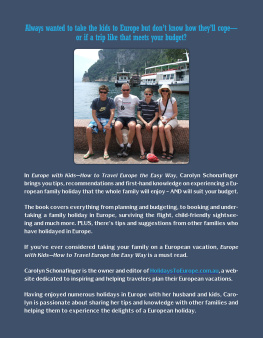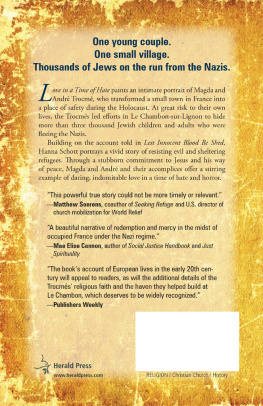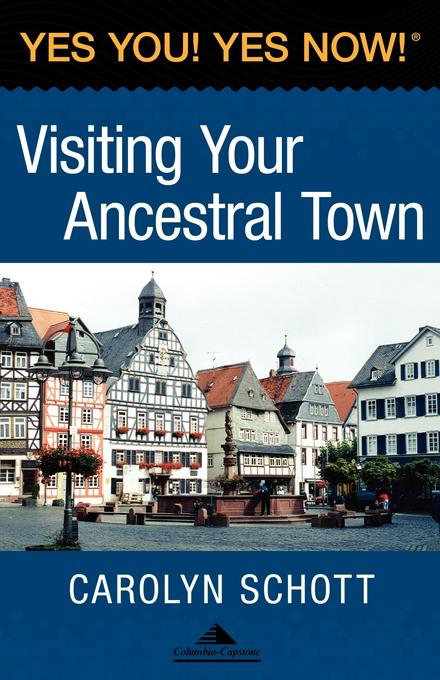
YESYOU!
YESNOW!
VisitingYour
AncestralTown
Connecting WithYour Family History
By CarolynSchott
Published byColumbia-Capstone
Copyright 2010Carolyn Schott
SmashwordsEdition
Yes You! Yes Now!, with orwithout punctuation, is a registered trademark ofColumbia-Capstone
Published by Columbia-Capstone,Sammamish, Washington
www.columbia-capstone.com
Cover design by Brion Sausser, www.bookcreatives.com
With appropriate citation,permission is granted to reproduce brief sections for purposes suchas criticism, comment, news reporting, teaching, scholarship, orresearch as permitted in Section 107 of the United States CopyrightAct of 1976. Requests for full chapter copies, commercial use, andall other uses should be directed to the publisher at .
ISBN-13: 978-0-9821148-2-7
ISBN-10: 0-9821148-2-6
Library of Congress Control Number:2010929382
Library of Congress subject headings
Travel
Family history
Genealogy
Travel Guidebooks
Ancestry
Cover photo: The town square in Butzbach,Germany. Photo courtesy of Carolyn Schott
Visiting Your Ancestral Town was written byCarolyn Schott, a travel expert who started her adventures justlike you: not knowing where to start or what to do. Learn from herexperiences and enjoy the entertaining stories that will eitherinspire you to try it yourself or wisely inform you to take someother path. Either way, youll enjoy the journey!
To my parents, Harry and EvelynSchott, who instilled in me the importance of family and the loveof travel that inspired this book. Also my genealogy mentor, DaleLee Wahl, who invited me on my first trip to visit ancestraltowns.
Contents
?
Why DoThis?
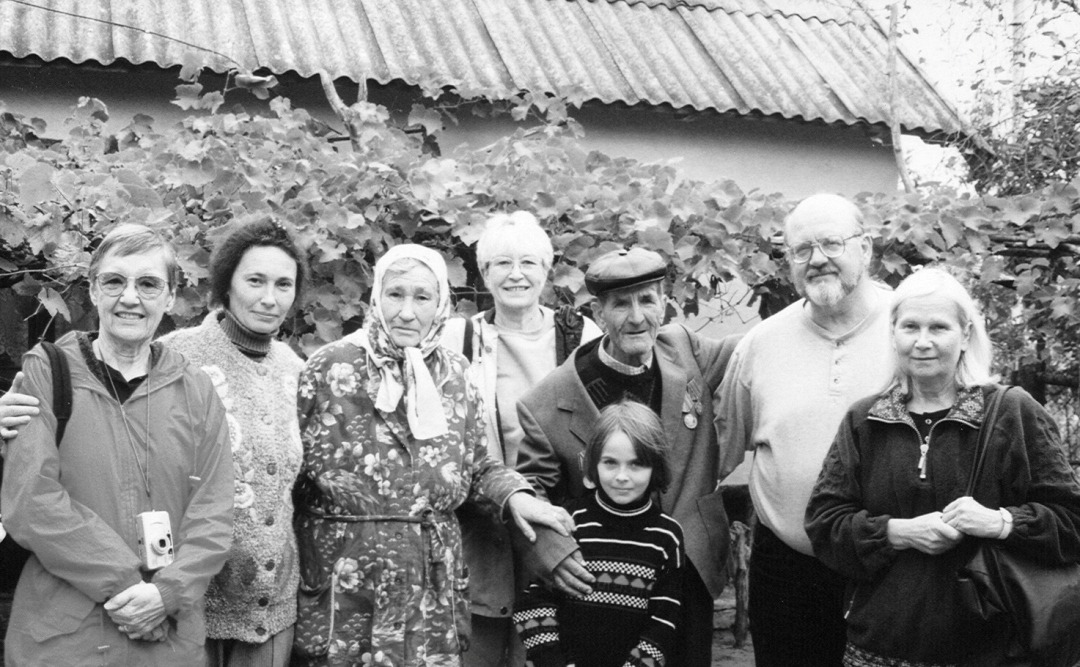
Visiting with the Kram family ofKassel (Velikokomarivka), Ukraine
Why Visit an Ancestral Town?
You may have grown up listening to yourparents or grand-parents stories of their childhoods. You mayhave an interest in history and want to get a glimpse of a placewhere your family once lived. You may be a genealogist wanting tosee for yourself the towns that are currently just names on yourfamily tree. Or you may want the opportunity to do genealogyresearch in a local archive, library, or historical society to seerecords you dont have access to at home.
Each of us has our own set of reasons to visitan ancestral town. And your own unique set of expectations for yourtrip will be key to deciding where to go and how to prepare.
Family memoirs and stories
Havent we all had our parents tell us astory like, Dont complain about walking to school, young lady.When I was your age, Id milked the cows and fed the chickens andthen still had to walk four miles to school.
But even when we roll our eyes, the storiestold by our parents and grandparents give us intriguing glimpsesinto the world they grew up in that is so different from our worldof the Internet and smartphones and Facebook. My parents storiesalways made me want to see the places that they talked about.
My mother grew up in a town called Lehr inNorth Dakota in the 1920s and 30s. Many of the memories of heryouth grew fuzzier for her over time, but never the stories of theannual camp meetings her church held at the nearby Lehr Tabernacle.Even in her 80s, her face would light up as she re-experienced thedelight she and her friends had searching the straw floor for coinswhich had dropped from peoples pockets. And then her stories wouldshift into her young adulthood, when she and her friends would walkinto the prairie hills beyond the tabernacle, playing guitars andsinging gospel songs, laughing, and of course, flirting with theyoung men.
Although I heard the stories of the campmeetings all my life and we visited my grandparents in Lehrthroughout my childhood, I never saw the tabernacle until I was anadult and took my mom to Lehr for the towns 100th anniversary.After a weekend of parades and church suppers, the final event ofthe celebration was a service in the tabernacle.
I was surprised to find out the tabernaclewas so close to town, just across the county road at the end of thestreet where my mother had lived. It was a surprise to see what ahuge complex it was, with a separate kitchen building, dorms,washrooms, and a cabin for the visiting pastor, all in addition tothe main tabernacle building. Seeing this for myself suddenly mademy moms stories make sense; how so many people could have come tothe camp meetings from neighboring towns, and even the next state,and stayed for a whole week.
Seeing the familiar places opened the doorsto new memories my mother had never shared before. That field iswhere everyone would come and camp out. And I remember all of ussharing a cup to drink water from this pump, she explained,pointing to each location.
But my biggest surprise came during theservice itself. My parents had faithfully taken me to church eachSunday when I was growing up. Even as a child Id loved the musicand singing and had never understood how my mother could dutifullystand and hold the hymn book each service, but never sing along.She appeared to be completely unmoved by the music.
But in the tabernacle on that Sunday morningin Lehr, the first song was an old gospel hymn, When We All Getto Heaven. To my surprise, my mom sang out loudly and clearly,never even looking at the hymn book. After all these years, shestill knew the words by heart.
When I asked her about it after the service, shesaid in her usual blunt fashion, Ive never liked thosePresbyterian hymns, but I like the old evangelical gospel music!By visiting and experiencing her hometown through her eyes, Ilearned something new about my mother that Id never guessed.
Visiting towns of more distant ancestors
The visit to Lehr had a very personalconnection for me because of my mothers stories. But Ive alsovisited the towns of more distant ancestors, hoping for a sense ofawe by walking in their footsteps, by seeing the places wheretheyd once lived but chose to leave.
When I went to Hoffnungstal (Nadezhdivka inUkrainian), an ethnic German village in Ukraine, I didnt expectmuch. From previous visitors Id learned the village had beendestroyed. I would not get to see the house where my grandfathergrew up or the church where he was confirmed. Even the cemetery hadbeen destroyed, so I wouldnt even find the graves of my familymembers.
Instead, I saw the valley as mygreat-great-grandparents, Peter and Katharina Schott, probablyfirst saw it. They were among the earliest settlers and when theyarrived, there would have been few houses. As I stood on thecemetery hill, knowing that somewhere beneath my feet lay thebodies of those great-great-grandparents and dozens of other familymembers, I felt like I was seeing the lush, green valley with theireyes. I felt the sense of hope they must have felt that caused thevillage to be named Hoffnungstal (Hope Valley in German). I felttheir sense of promise as they started a new life for their youngfamily far away from their own parents and grandparents. Andperhaps this same sense of hope and promise later caused mygrandfather to leave there and come to America.
Traveling a road less traveled
Visiting an ancestral town can offer a uniquetravel experience away from typical tourist destinations andfacilities. This gives you the opportunity to see a more remotelocation or connect with real people living there, rather than justtour guides and hotel clerks. (Unless, of course, your family camefrom a town that now happens to be a popular tourist destination.But thats not the case for most of us.)
Next page
